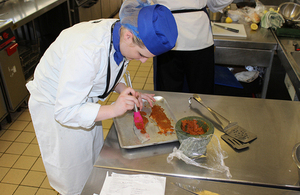Improving working lives for women in the care, cleaning and catering industries
Women care workers, cleaners and catering staff could be set for a boost in job satisfaction and pay thanks to a new competitive fund from the UK Commission for Employment and Skills (UKCES).

Catering staff. Photo by Photograph by matchfitskills / flickr.com. Used under Creative Commons 2.0 CC BY-SA 2.0.
Two thirds of those earning low pay in the UK are women. One reason is that women are concentrated in low paying occupations and sectors. Females also make up 77.5 per cent of part time employees, and there are big differences in pay for full time and part time workers. In 2014 the average full time hourly pay for women was £12.31 compared with £7.95 for part time.
Women in the adult social care, cleaning and commercial catering industries are amongst the worst affected, where part time work, insecure and unsociable hours and low pay is typical, with many staff earning well below £10 per hour.
The latest competitive fund in the UK Futures Programme, run by UKCES, responds to the reality that businesses and the economy are currently losing out on women’s full potential in the workplace. It’s estimated that this gender-related market failure costs the UK economy between £15 billion and £23 billion annually, whilst solving the problem could add 1.3 to 2.0 per cent to GDP every year.
The business benefits of addressing the gender pay and opportunity gap start with reducing staff turnover and recruitment costs. Research shows that improving staff satisfaction and retention improves customer service and offers real productivity benefits.
Although policy and legislation have helped make progress on this issue, the UKCES competition recognises the vital leadership role of employers in tackling the problem. It also acknowledges that gender inequality in work isn’t just about men being paid more than women. It’s also about how women are valued for the work that they do.
Gail Cartmail, Assistant General Secretary at Unite the Union and a Commissioner at UKCES commented:
The gender pay and opportunity gap is a hardy perennial with long, strong roots and I am impatient for new tools to weed it out. As a UKCES Commissioner, I’m calling on employers to come forward with fresh ideas for action on the ground and to find practical answers to the gap in pay and opportunity that millions of women face day in, day out.
Work by UKCES and others shows how improving productivity is essential if we are to maintain business competitiveness, increase wages and raise living standards. We can only do that by valuing and investing in our whole workforce. It makes no sense to allow large parts of it to go undervalued and underutilised.
UKCES are keen to hear from employers in the adult social care, cleaning and commercial catering sectors with a significant proportion of women in their workforce (30 per cent or more). Proposals should seek to pilot innovations in good job design (including challenging typical working patterns and practices) for lower paid women workers.
Proposals must be joint investments, with organisations investing in cash, in-kind, or both, alongside a maximum government contribution of £180,000 per project. The total fund available is £1 million.
The full competition brief is available on GOV.UK.